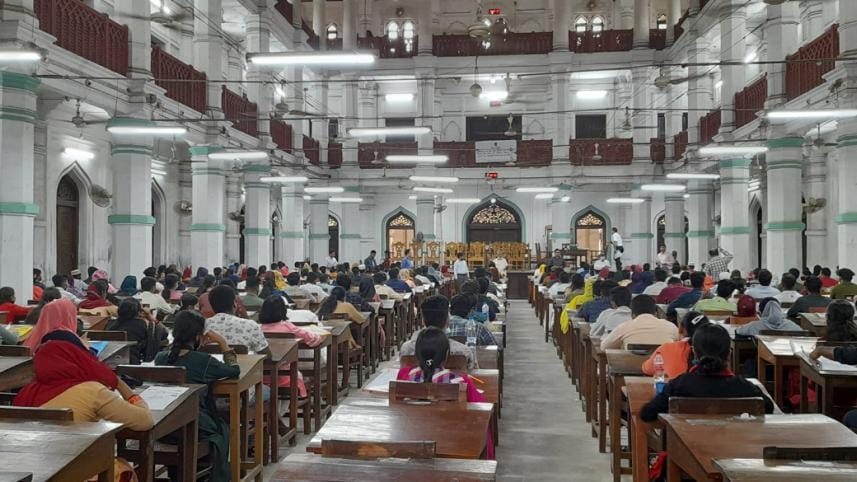Why isn’t the public university system sympathetic to older students?

In a speech at Jahangirnagar University in 2022, the Minister of Education, Dr Dipu Moni said, "People of any age have the right to study in university if they can pass the admission test." However, that still remains a distant reality. Within the public university admission system, if an individual did not pass the Higher School Certificate (HSC) examination with the two most recent batches, they are not allowed to seek admission.
Education is supposed to be available to everyone regardless of gender, ethnicity, religion, and age. Unfortunately, due to certain policies, or the lack thereof, the system has turned out to be inherently discriminatory towards students who have simply not had the privilege of continuing their education due to the harsh realities of life.
There have been instances where people have sat for their 12th grade examinations again, at a later age, solely to gain admission to a university. Khanom Begum* got married at the age of 18 and was unable to pursue her studies further. That is, until her divorce some two decades later. "Deprived of the financial support of my family and unable to get an appreciable income without a proper degree, I decided to enroll in a university. However, to do that, I first had to retake the intermediate examination," she bemoans. After completing her HSC from Eden College, she eventually successfully secured a place in the Economics department at Dhaka University.
The very fact that she had to go through so many loops to simply check a box in the admission criteria seems cruel. She obviously had the skillset and grit necessary to weather through the admission cycle. So, why wasn't she allowed to just take the admission test?
It is the unfortunate truth that many women suffer from fates similar to Khanom Begum. Due to the familial pressures, early and child marriages nip many women's dreams of getting a tertiary education in the bud. Their families might not be open to letting them attend universities, wishing for them to stay solely in the role of housewives. For 36-year-old Nasrin Sultana, such was the situation.
"I was married at 17; by 19, I already had a child. My husband's family wasn't in favour of me getting an education in the early days. And, later, I decided to focus on raising my children instead," she says. "When I reached my mid-30s, however, the family was okay with me returning to my studies but now there was almost no way for me to do so."
Private universities do not restrict the amount of time that can transpire between a student completing their secondary education and seeking admission. But the private university system comes with its own slew of problems.
"With a price tag at upwards of 10 lakhs, seeking an undergraduate degree at a private institution is not feasible for most students," states Nasrin. "My husband's family was not comfortable investing that amount of money for an education they didn't even think I needed."
The competitive nature of private university admissions and the emphasis on previous educational records for scholarship eligibility mean that even if an individual is meritorious, they might not qualify for a tuition waiver. Thus, many students don't consider private universities to be a viable option.
It's not just women who become victims of these public university admission rules. Golam Rabanni, 67, had to quit his educational pursuits at 19. Coming from a lower-income household, he had to go into the workforce to provide for his family. When his economic situation became comfortable enough and he retired, he thought of giving higher studies another shot only to be deterred by the obstacles in his path.
It is somewhat understandable that the public universities in Bangladesh are choosing to do so because of the limited number of seats available in these universities. However, in a country with such an abundance of students, it is incredibly unfair. What is perhaps worse than the existence of such a limitation, is the fact that there is virtually no committee you can appeal to. Should you object to these rules or want your case to be considered individually, you don't have any means of doing so before an authority.
Why is the public university system so unsympathetic to older students who might want a second chance at education?
*The name has been changed to preserve privacy upon request.
References:
The Daily Star. November 4, 2022. Dipu Moni against age limit in public university admission
Adrita Zaima Islam is an A-level student.




 For all latest news, follow The Daily Star's Google News channel.
For all latest news, follow The Daily Star's Google News channel.
Comments